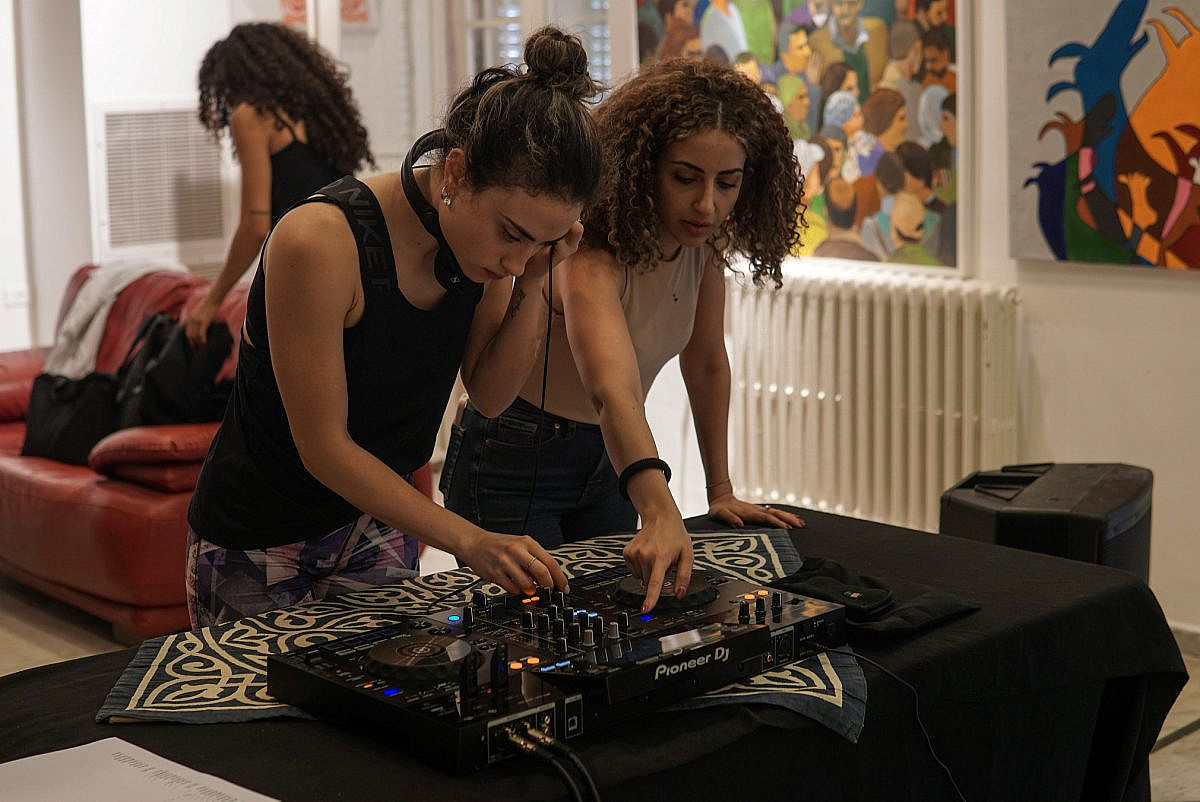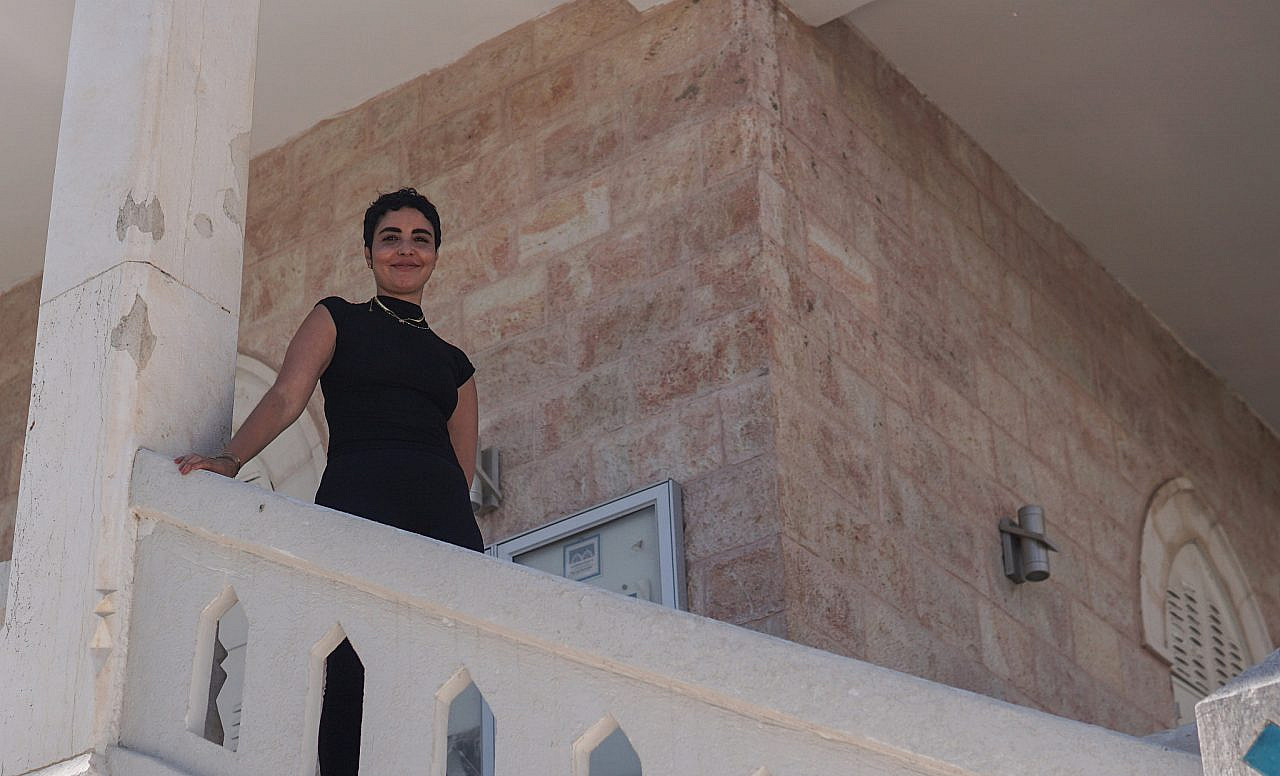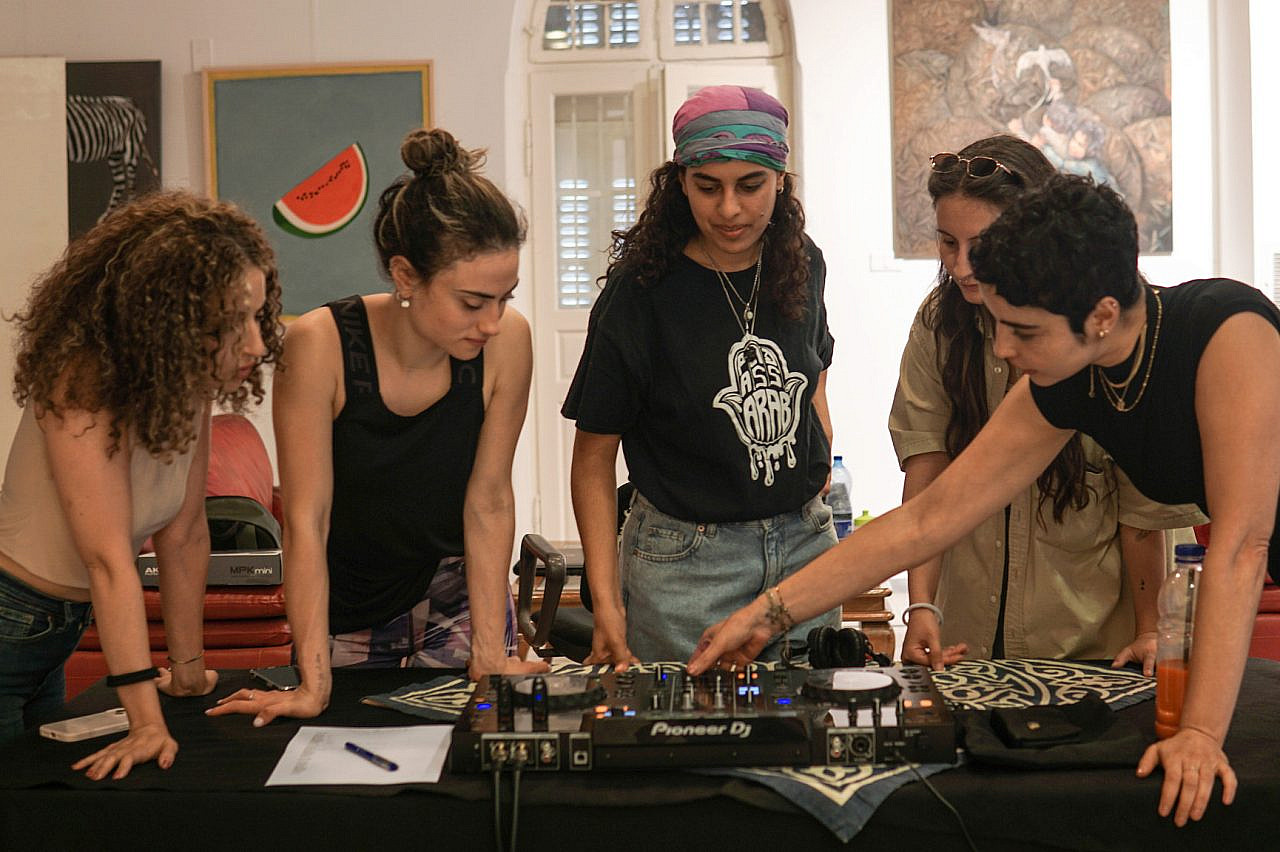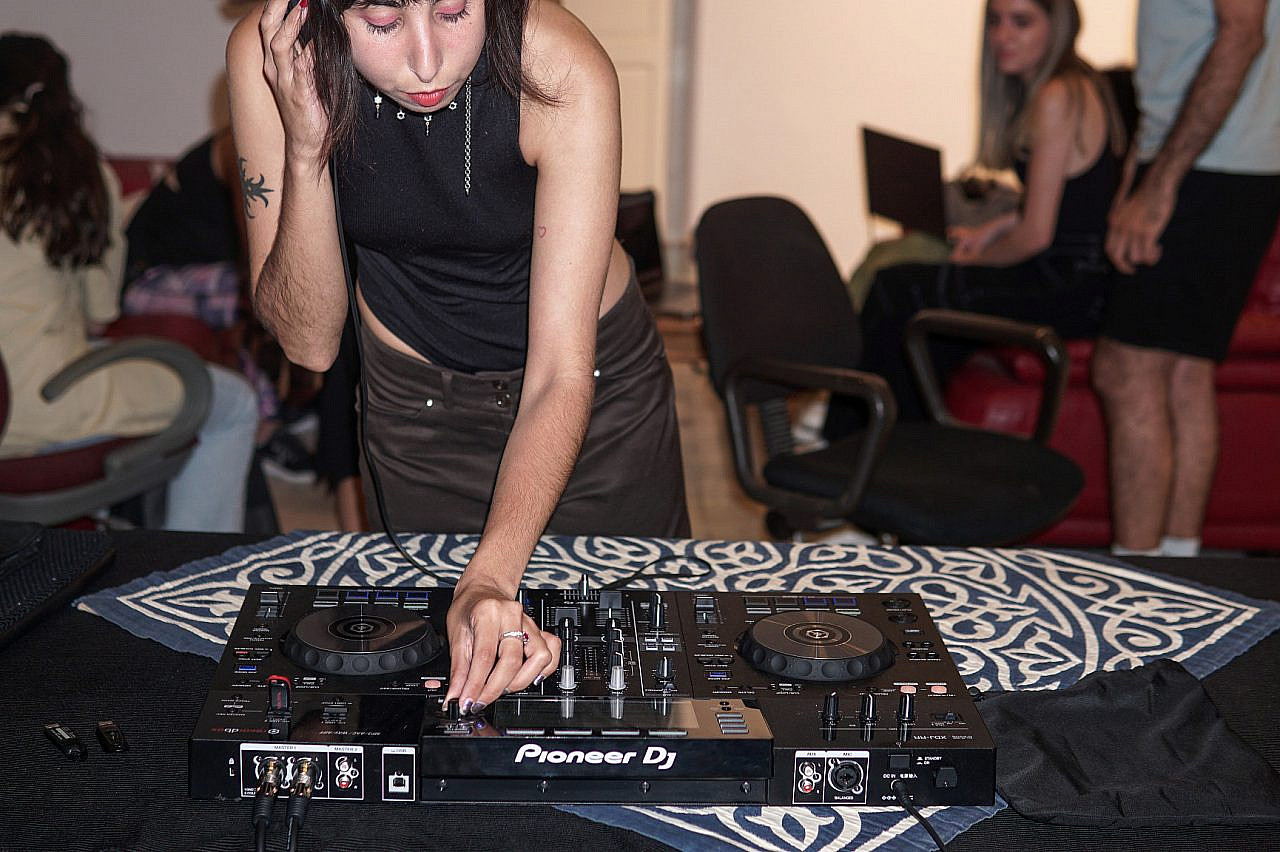It’s a baking hot day in the Jerusalem neighborhood of Sheikh Jarrah, but Nour Palestina is dressed head to toe in black, and so are most of the women she’s teaching how to DJ. Everyone looks club-ready; some have monochrome tattoos snaking down their arms, and most have multiple piercings. They’re gathered around a table in Sabreen — a music studio, event space, and gallery — listening intently as Nour explains how to blend one track into another. They absorb every word like a sponge, nodding in unison to the rhythmic electronic music pumping out of the speakers.
It is the second day of a three-day workshop for Palestinian women run by Nour, who is a DJ, producer, and activist. Ask any of the women why they’re here and they’ll all cite Nour herself: she’s an inspiration to each of them, having dedicated her career to platforming those most marginalized in Palestinian society through her electronic music, documentary filmmaking, and workshop facilitation.
For this event, Nour teamed up with Future Female Sounds, a Copenhagen-based all-female non-profit that empowers women through music. Sabreen, where the workshop is hosted, is located on the top floor of the magnificent Dar Al-Tifl Al-Arabi Institute for Culture, Arts, and Literature. Around 33 women applied to take part, but those living in the West Bank were unable to access it because they do not have permits to enter Israel. “The occupation has been our biggest challenge,” Nour says.
The women take it in turns to try their hand on the decks. One woman with tight curls and a Nike tank top plays a slow house track with Arabic vocals. She’s in a state of deep focus, her brow furrowed with concentration.
“Who has done their homework?” Nour asks over the music. Everyone looks a bit shifty. “Okay — let’s see what you’ve done.”
The women gather on the red leather sofas, bustling as they get their laptops out. No one has done the homework, so Nour spends the next hour helping them download the DJ software Rekordbox and upload their music onto USBs.
Nour was born in the East Jerusalem neighborhood of Silwan, about a 15-minute walk away from the studio in Sheikh Jarrah. She was 10 years old when she first noticed an Israeli flag hanging out the window of what used to be her neighbor’s apartment, and that’s when she realized things weren’t going to get any better. Nour moved with her family to Canada as a teen, but that only calcified her connection to Palestine. Whenever she came back to visit, she had to be pried away. “I cried every time I got on the plane to leave,” she says.
In Canada, Nour was repeatedly surprised by the ignorance surrounding Palestinian history, so she made it her life’s mission to share it. She began DJing in 2014 and gave herself the moniker Nour Palestina, so that her work would always be inseparable from her homeland. “I decided on that name right away,” she says. “And I got a lot of backlash from people saying I should establish myself first — but I said no. I’m Palestinian, and I’m going to use my platform to talk about Palestine.”
Nour’s dream is to help connect Palestinians in the diaspora with their homeland, whether through music, activism, or film. “You ask any [Palestinian] kid who’s never been to Palestine where they are from, and they’ll say the exact village their grandparents were kicked out of,” Nour says. “And that’s the beautiful thing about my people: we pass on the Palestinian cause from generation to generation.”
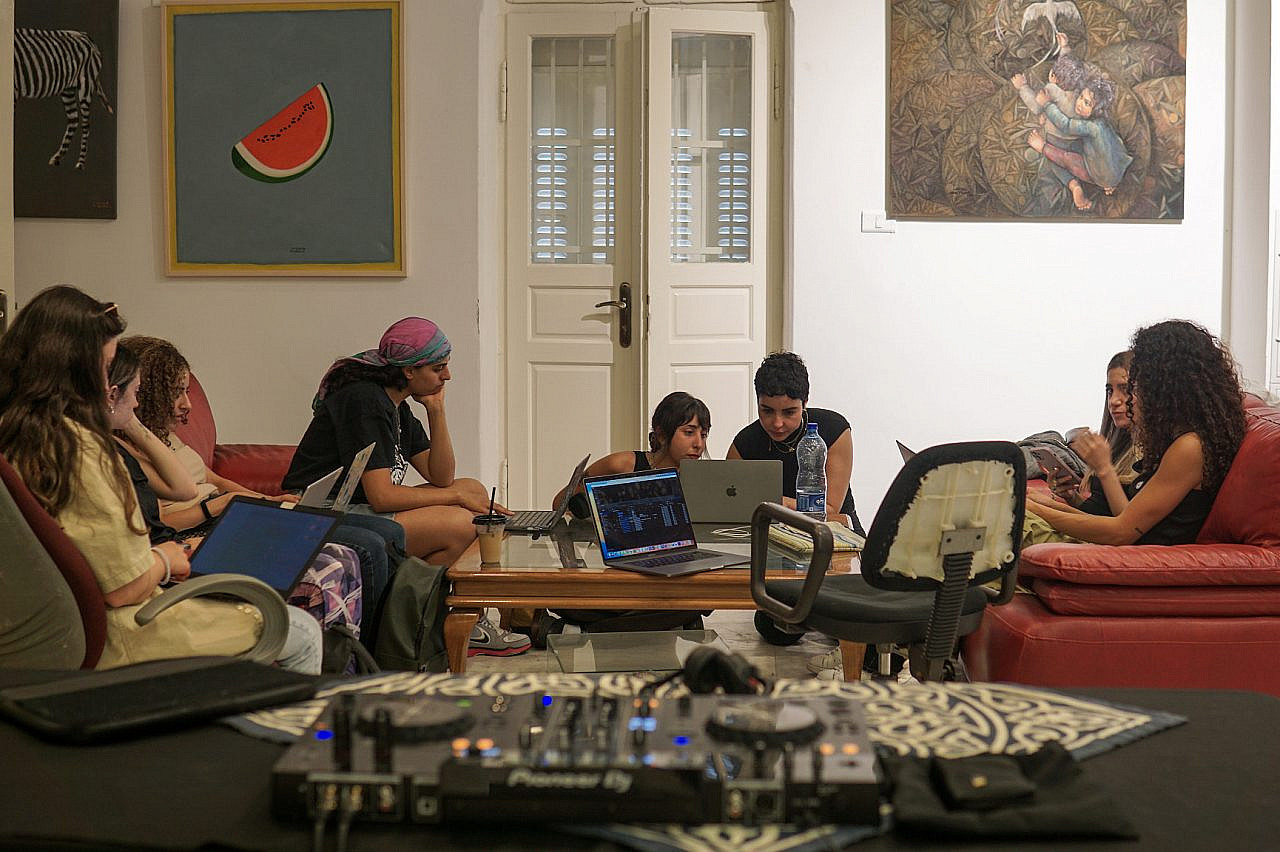
Over the years, Nour helped set up a community radio station in Amman with Berlin-based station Refuge Worldwide, and launched the Refugee Chronicles project, where she interviews Palestinian elders in camps across Palestine, Lebanon, and Jordan. After this workshop in Sheikh Jarrah, Nour will head back to Jordan to run a five-day workshop with Palestinian children in a refugee camp — one of three camps in Jordan that have not been granted refugee status, meaning its inhabitants have zero rights and do not receive services from the UN Relief and Works Agency.
“I always end up getting really attached to these kids,” Nour says. “After a few days I find it so hard to leave them.”
Nurturing talent and self-belief
There’s a tangible connection between Nour and the women today — one of empowerment and respect. The women support each other in a literal sense; they lie, lean, and recline on one another, and whenever Nour says anything, their faces light up.
As the group completes the homework in class, a woman with curly long hair and charismatic stage presence rushes in. She’s late, she tells us, because she stayed with a friend in Beit Jala near Bethlehem, and her entire bus heading to Jerusalem got held up and searched at a checkpoint. It set her back a couple of hours.
Outside, on the white marble balcony overlooking East Jerusalem, another participant, Sophia, rolls a cigarette. She has long, brown cork-screw hair and wears a black crop top with green trousers. She’s from a small neighborhood in the city, only a 10-minute drive away, but which usually takes 40 minutes because of traffic.
“I’d never heard of anything like this in Jerusalem before,” Sophia says, speaking softly. “It’s nice that a really huge DJ like Nour would do a free workshop.”
Sophia says she struggles in Jerusalem because there isn’t enough to keep her stimulated. “I love Jerusalem, it’s my city, but I’m bored. I want more things to do here.” So these DJ workshops scratch a creative itch, and the fact it’s run by Nour is the icing on the cake. “She’s amazing,” Sophia gushes. “She’s so cool. She’s a really good person and patient. Honestly, I’m so grateful for her.”
If Sophia lived in Haifa or Ramallah, she would probably have more to keep her entertained: Haifa has hotspots like the Palestinian nightclub Kabareet, while Ramallah has an established underground scene.
In 2018, a documentary by electronic streaming platform Boiler Room exposed the world to Ramallah’s nightlife and the community’s daily struggles under occupation. The film catapulted DJ and producer Sama’ Abdulhadi to the global stage, where she firmly remains as Palestine’s most successful export in the electronic music world. This same documentary helped mobilize many in the international dance music community to express solidarity with Palestine, with artists like Blessed Madonna, BEN UFO, Four Tet, and Caribou refusing to play in Israel as protest.
But the novice musicians in Sheikh Jarrah face a different set of challenges to artists in the wider West Bank. They do not have access to the same potential funding, and their legal status is precarious, with Israeli rules and regulations threatening to revoke their “permanent residency” in their hometown at any time. The Palestinian community of Jerusalem is effectively orphaned, politically cut off from the Palestinian Authority in Ramallah and subjugated by Israel. So when it comes to Palestinian cultural spaces in Jerusalem, few have survived, and we’re standing in one of them.
Sabreen’s brand started as a Palestinian music group in the 1980s. They were one of the first in the community to combine modern and traditional Arabic music elements with current political affairs, and toured all over the world during the ‘80s and ‘90s. Their releases coincided with important moments in Palestinian history, with their 1982 album “Dukhan el Barakin” (Smoke of the Volcanoes) reflecting Israel’s occupation of southern Lebanon, and 1987’s “Maout el Nabi” (Death of the Prophet) acting as a tribute to the youth who died fighting for Palestinian liberation.
In 1987, the concept expanded into the Sabreen Association for Artistic Development, a community-based NGO dedicated to promoting Palestinian culture in Jerusalem through different artistic expressions. Over the years, their studio and event venue in Sheikh Jarrah became a second home to Palestine’s artists, and a space for them to meet, collaborate, exchange ideas, and flourish. Sabreen is dedicated to platforming Palestine’s most marginalized artists, helping them fulfill their potential by offering them a place to record, film, perform, and produce.
The association is currently run by the son of Said Murad, Sabreen’s founder, who met Nour at the original Sabreen studio. “So many artists passed through that studio, every Palestinian artist you can think of,” says the younger Murad.
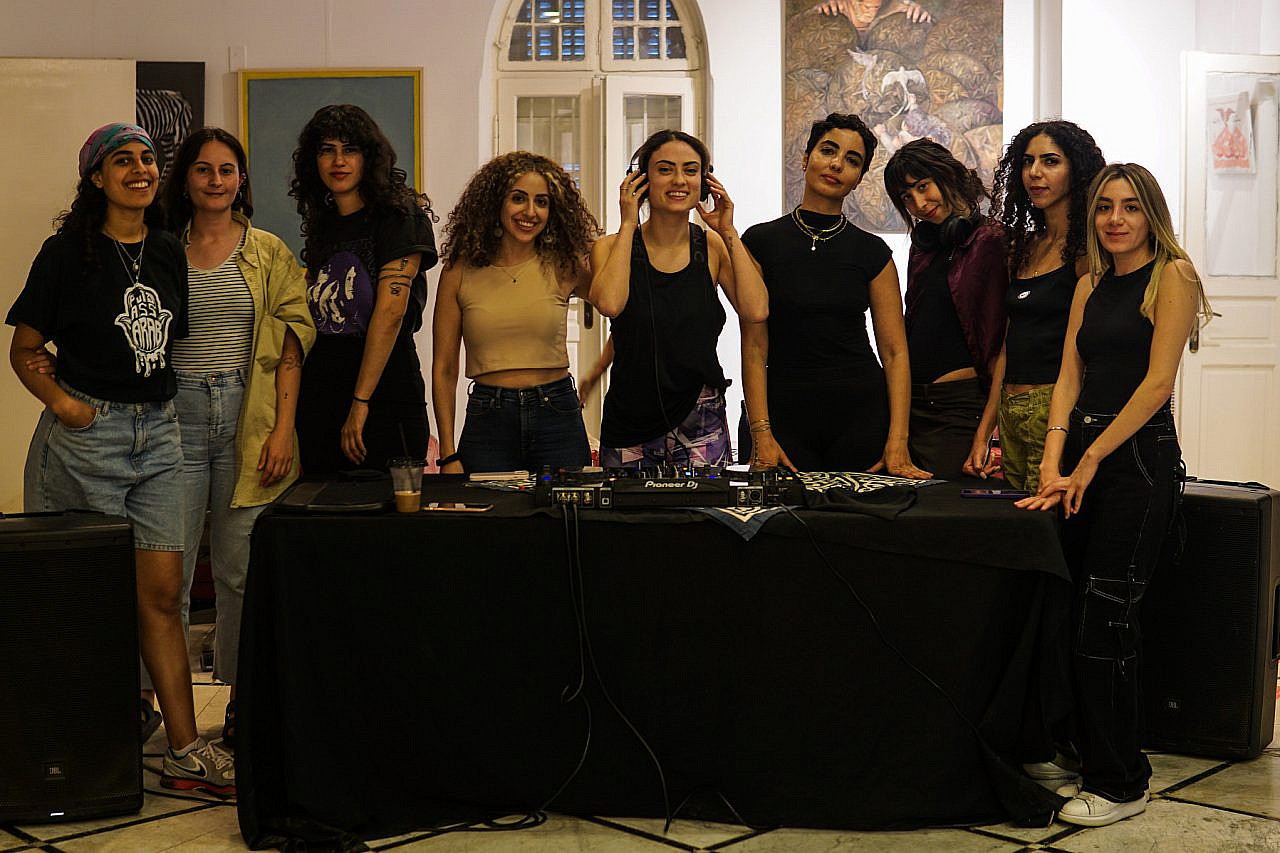
Maintaining a cultural space in the heart of Sheikh Jarrah was never easy, but Sabreen always managed to secure funding. That funding started to dissipate in the run-up to COVID, however, and when the first pandemic lockdown hit, the association lost it altogether. In 2022, after 35 years, Sabreen was forced to close its doors.
“It was sad having to leave the space that we’d been in for so long,” Murad says. “We don’t have other spaces for people who want to do alternative things, experiment and explore. It was very emotional.”
But Sabreen refused to give up on its vision. They launched a crowdfunding campaign to raise awareness, and received enough funding to secure a new space. Since August 2022, they’ve been in the upstairs room of Dar Al-Tifl Al-Arabi Institute, with an event and gallery space as well as a recording and production studio. They’ve already launched a handful of projects, including the EU-funded Watermelon Seeds project, which asked Palestinian Jerusalemites to share a song idea, with Sabreen producing and making music videos for five of them.
So despite the plethora of challenges the organization faces, Sabreen still plays a crucial role here in Jerusalem. By nurturing young talent and platforming marginalized artists, they give the Palestinian community opportunities, resources and — most valuably — self-belief. And with people like Nour here to support them, one of the women here today might just be the next Sama’.

